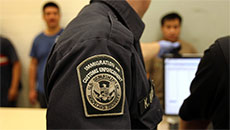Within hours of the World Health Organization designating Omicron a variant of concern late last month, Moderna issued a press release telling the public it was already working on a vaccine booster that could target the new threat.
The quick response was no surprise to experts, who credited it to cutting edge technology honed in an age of COVID-19 that has both hastened vaccine development and made them easier to adapt.
Virologists and immunologists say advancing science will increase our ability to tailorvaccines to newvariants, while researchers also point to new technologies that promise further gains — including a hoped-for jab that could protect against multiple pathogens, even ones we don't know about yet.
"One of the nice things about the mRNA vaccines is this is a new technology, but it's also very rapidly adaptable," said Kelly Grindrod, a pharmacy professor with the University of Waterloo.
"That's always been the selling point of it — that it can be tweaked as needed."
Current COVID-19 vaccines work by showing the immune system how to recognize the SARS-CoV-2 spike protein, which is what the virus uses to gain entry to human cells.
The shotshave so far proved effective against other variants, but the mutations seen in Omicron, which include more than 30 changes to the spike protein, have raised fears this incarnation may escape vaccine protection.
Eric Arts, a microbiologist at Western University, says if a variant-specific booster is needed, the flexibility of mRNA technology means updates can be made "within an afternoon" — as long as scientists have the new genetic information they need to adjust the jab's target.
"The change to put the Omicron spike protein into it is pretty minor in terms of vaccine development. But it's still got to go through human testing," said Arts, adding that could delay how quickly new vaccines are made available.
"I'm certain Moderna and Pfizer already have prototypes even though (the variant) was only just discovered. They'll work on that very rapidly to get something out there for clinical testing, I would say maybe as soon as January."
While Moderna and other pharmaceutical companies work towards updatingvaccines, other researchers are attempting to develop what's been dubbed a "universal coronavirus vaccine" that could protect against different coronaviruses and their variants, as well as potential future mutations.
The idea has gained significant traction recently, but it's not a new concept, said virologist Jason Kindrachuk.
The University of Manitoba researcher said a universal vaccine would work by targeting several structural elements that are common to many coronaviruses, including but not limited to the spike protein.
If mutations emerge, it would still work in theory because it hones in on those "universal building blocks."
"The reality is there is an increasing likelihood of us being able to utilize the technologies that we have and our understanding of viruses to potentially make a universal vaccine," Kindrachuk said, before adding that's easier said than done.
"Nature has continued to be exceedingly complex. So whether we are going to be able to create a true completely universal coronavirus vaccine is a big question."
Some Canadian researchers have already begun constructing their versions of universal coronavirus vaccines using different technologies.
McMaster University's Matthew Miller believes his team is on the right track with a viral-vector based product that's inhaled rather than injected, in order to elicit immune responses directly in the lungs.
The proposed vaccine targets the spike protein and two other proteins that haven't mutated from the original virus strain, Miller said, meaning it should still work on the Omicron variant.
"We realized that SARS-CoV-2 was going to continue to evolve and there were inherent limitations in current vaccines, which only focus on (the) spike," Miller said.
"It made a lot of sense to target (the) spike as a starting place ... but now we're in a situation where our understanding of how the immune system fights coronavirus infections is becoming much more sophisticated."
Miller has worked on the vaccine candidate with fellow immunologist Zhou Xing since last summer, and McMaster announced Tuesday that phase 1 human trials are set to begin soon.
John Lewis, a cancer researcher at the University of Alberta and the CEO of Entos Pharmaceuticals, is also working on a possible universal coronavirus jab, in addition to a separateCOVID-19 vaccine that's currently in phase 2 trials.
The universal prospect was developed using machine-learning artificial intelligence that highlighted similar proteins on different coronaviruses so researchers knew which to target. The approach focuses on a few different proteins, including one called the nucleocapsid, which Lewis said is not likely to mutate "without messing up the function of the virus."
"It seems like the vast majority of changes (in Omicron) are on the spike protein, so we think the pan-coronavirus approach we've taken shouldn't be affected," he said.
Entos's proposed vaccine uses a "fusogenic" technology to deliver the virus' genetic information through DNA, which is more stable than RNA and doesn't need to be stored at ultra-cold temperatures, Lewis said, adding the jab could potentially be effective with just one dose.
While the idea of a universal coronavirus shot is promising, the effectiveness of such a product remains to be seen.
Experts wonder whether some efficacy might be sacrificed in creating a more general vaccine that targets multiple pathogens, rather than one that fights a specific iteration of the virus.
Lewis said a universal jab could have "a slightly lower antibody response but a strong T-cell response," which he believes would produce "much broader coverage" in preventing severe disease, even if protection against infection was lower than other vaccines.
Arts said the biggest impediment to creating a successful universal vaccine will be in predicting the complex evolution of viruses and which new pathogens might emerge.
"We've never been good at guessing," he said. "And the number of possibilities are almost infinite."

